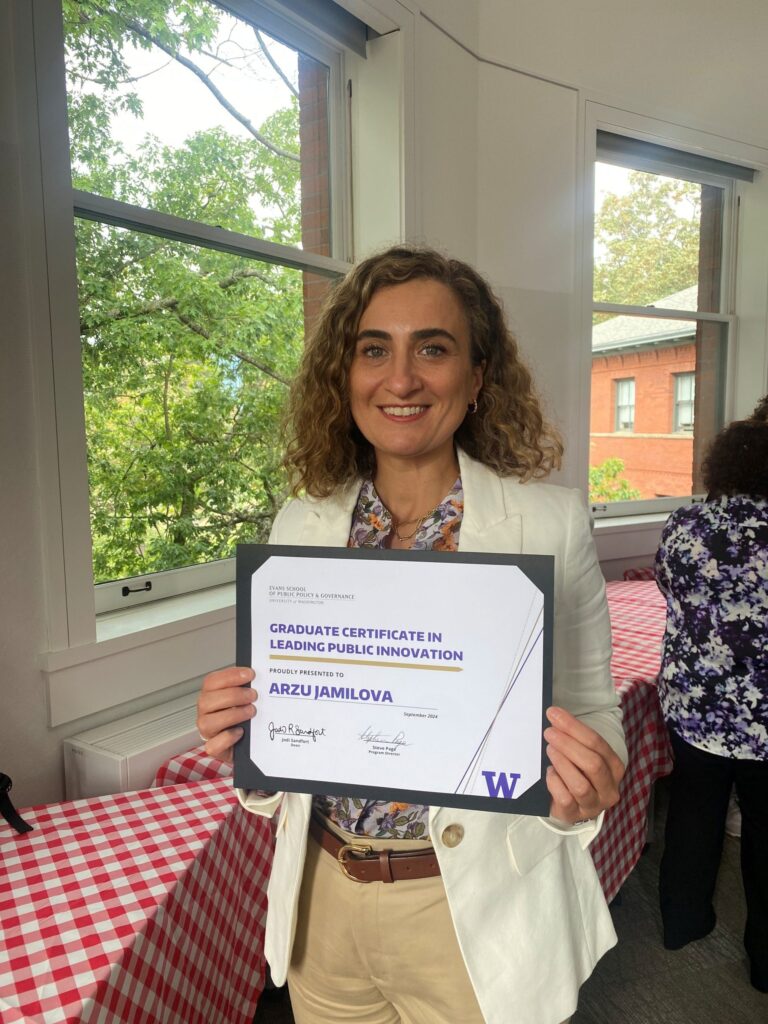Alumni Spotlight: Arzu Jamilova
When Arzu Jamilova first visited the United States in 2016, she and her husband were immediately drawn to the energy of the Pacific Northwest—the atmosphere, the natural beauty, and the thriving tech industry. It felt like a place where they could build something new. Back in Azerbaijan, Arzu had spent years working in HR and talent acquisition, eventually running her own recruiting and executive search business, helping tech companies find and hire the right talent. Her husband worked in project management within the telecom industry, but in Azerbaijan, opportunities in tech were limited. The main industry drivers were oil and gas, leaving little room for professionals like them to grow. After their visit, the couple started seriously considering business immigration, and soon, Arzu made the leap—expanding her business to Seattle and beginning the journey on an E-2 visa.

As she settled into the U.S. and continued her work in talent strategy, Arzu discovered the Evans School’s Graduate Certificate in Leading Public Innovation. The program’s focus on human-centered design, addressing inequities and improving efficiency, and real-world project management immediately caught her attention. She had long been intrigued by human-centered design, the idea of putting people at the core of problem-solving but had never explored it in a structured way. The program felt like an opportunity to not just learn about these concepts, but to actively apply them. With years of experience in HR, she was particularly interested in how human-centered design could transform hiring practices, making them more inclusive, thoughtful, and responsive to the needs of both candidates and organizations.
Through the certificate program, Arzu’s perspective on HR and recruiting shifted. Before, she had primarily focused on improving the candidate’s experience, assuming that gathering feedback from applicants would be enough. But she realized that meaningful change in hiring processes required understanding the experiences of everyone involved: candidates, hiring managers, recruiters, and HR professionals alike. Each had their own pain points and challenges. By embracing a co-design approach, she began incorporating diverse perspectives into the hiring process early on, ensuring that any changes were truly effective and equitable.
Inspired by what she learned at the Evans School, Arzu launched Candidate Centric, a consultancy dedicated to improving hiring experiences through empathy, equity, and collaboration. She also developed a training course, Human-Centered Hiring: Foundations for Effective Recruitment, now available on Udemy, directly applying the principles she had studied. The program gave her not only the knowledge but also the structure to translate human-centered design into actionable tools that organizations could use to build more thoughtful and effective hiring systems.
Looking ahead, Arzu hopes to expand Candidate Centric beyond hiring, applying human-centered design to other aspects of talent management, including onboarding, performance evaluation, and overall employee experience. She envisions a future where organizations move away from outdated, rigid hiring structures and toward approaches that are more inclusive, responsive, and human-centered. The lessons she gained at the Evans School continue to shape her work every day, reinforcing a mindset that puts people at the center of every decision. More than just a learning experience, the program connected her with a community of like-minded professionals, people who challenged and inspired her, and who continue to be part of her journey.
For those considering the Graduate Certificate in Leading Public Innovation, Arzu offers simple advice: “Go for it. You will get so much more than you expect.” The program, she says, not only provides practical tools for rethinking how systems are designed but also fosters a network of supportive, creative, and passionate individuals. For Arzu, it was more than just professional development—it was a transformational experience that continues to influence her work and her vision for the future.